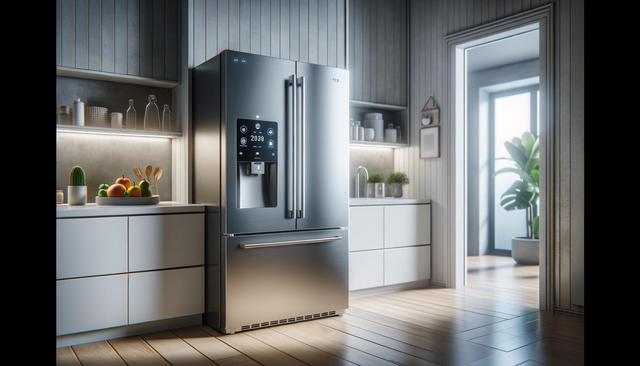
Smart Refrigerators: Navigating the Shift to High-Tech Cooling in 2025 – Your Essential Guide
The Rise of Smart Refrigerators in Modern Homes
Smart refrigerators have rapidly transitioned from niche luxury items to mainstream kitchen essentials. As households become increasingly connected, these high-tech appliances are meeting the demand for convenience, efficiency, and sustainability. Equipped with Wi-Fi connectivity, touchscreens, and internal cameras, smart refrigerators are transforming how families manage food storage and meal planning. The shift to smart appliances is not just about functionality—it’s a response to evolving lifestyles that prioritize digital integration and real-time information.
Driven by advances in the Internet of Things (IoT), smart refrigerators can now sync with other devices, enabling features like remote temperature control and inventory tracking. These innovations are particularly useful for busy households, where staying on top of grocery lists and minimizing waste is a daily challenge. As 2025 approaches, the role of smart refrigerators is expanding, with many units offering compatibility with digital assistants and home automation systems, allowing users to control settings through voice commands or smartphone apps.
Core Features Redefining Food Storage
One of the most striking aspects of smart refrigerators is their feature-rich design. These appliances offer much more than traditional cooling—users benefit from a range of intelligent functions designed to increase efficiency and reduce food waste. Key features include:
- Internal cameras that allow users to view contents remotely via an app
- Automatic inventory tracking that alerts users when items are running low or expiring
- Customizable temperature zones for different food types
- Energy usage monitoring to promote sustainability and cost savings
These functionalities are particularly valuable in promoting healthy eating habits and reducing grocery expenses. By receiving expiration notifications and recipe suggestions based on current contents, users can better plan meals and avoid unnecessary purchases. The integration of machine learning further enhances these benefits, as the refrigerator learns user habits over time and offers increasingly relevant suggestions and reminders.
Smart Refrigerators and the Connected Kitchen
As smart home technology continues to evolve, smart refrigerators are becoming a central hub in the connected kitchen ecosystem. These appliances often interface with other smart devices such as ovens, lights, and even grocery delivery services. This integration allows for seamless coordination across cooking and shopping activities. For example, a smart refrigerator can send a grocery order directly to a local store when it detects that staple items are low.
Beyond automation, the connected kitchen emphasizes user convenience. Many smart refrigerators feature touchscreen displays that provide access to calendars, weather updates, and video calls—turning the kitchen into a multifunctional space. For families, this means better coordination of daily routines and improved communication. As we move closer to 2025, manufacturers are focusing on enhancing these collaborative features, making the smart refrigerator a true centerpiece of home life.
Security and Privacy Considerations
While the benefits of smart refrigerators are clear, the shift to connected appliances also raises important concerns around data security and privacy. These appliances collect and transmit data to provide personalized experiences, which means users must be mindful of how their information is stored and shared. Manufacturers are increasingly addressing these concerns by incorporating robust encryption protocols and offering user-controlled privacy settings.
To ensure a secure experience, users should:
- Regularly update firmware to protect against vulnerabilities
- Use strong, unique passwords for connected apps
- Review and customize data-sharing settings within the device
Awareness and proactive management of these settings can help users enjoy the benefits of smart technology without compromising their privacy. As the industry matures, expect continued improvements in cybersecurity measures tailored specifically for smart home appliances.
Environmental Impact and Energy Efficiency
Another major driver behind the adoption of smart refrigerators is their potential for environmental impact reduction. Many models are designed with energy efficiency in mind, incorporating features that reduce electricity use without sacrificing performance. Smart sensors optimize cooling cycles based on usage patterns, while energy tracking tools help users monitor consumption and identify opportunities for savings.
Additionally, these appliances contribute to sustainability by:
- Reducing food waste through smart inventory and expiration tracking
- Allowing better organization and visibility of stored items
- Promoting responsible energy use with eco-friendly modes
As global attention on climate change and resource use intensifies, consumers are placing greater value on appliances that align with sustainable living goals. Smart refrigerators offer a practical way to support those goals while enhancing everyday convenience and functionality.
Conclusion: Preparing for a Smarter Kitchen in 2025
Smart refrigerators represent a significant step forward in home appliance innovation, blending advanced technology with practical functionality. As we approach 2025, these appliances are set to become even more intuitive, efficient, and integrated into the broader smart home ecosystem. Whether you’re upgrading your kitchen or simply exploring the future of food storage, smart refrigerators offer a glimpse into a more connected and sustainable lifestyle. By understanding the features, benefits, and considerations involved, households can make informed decisions that align with their needs and values in the evolving world of high-tech home living.